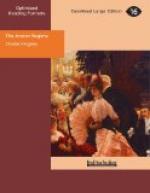Accordingly we shall find, throughout the 18th century, a stirring of thought, an originality, a resistance to circumstances, an indignant defiance of circumstances, which would have been impossible, had circumstances been the true lords and shapers of mankind. Had that latter been the case, the downward progress of the Ancien Regime would have been irremediable. Each generation, conformed more and more to the element in which it lived, would have sunk deeper in dull acquiescence to evil, in ignorance of all cravings save those of the senses; and if at any time intolerable wrong or want had driven it to revolt, it would have issued, not in the proclamation of new and vast ideas, but in an anarchic struggle for revenge and bread.
There are races, alas! which seem, for the present at least, mastered by circumstances. Some, like the Chinese, have sunk back into that state; some, like the negro in Africa, seem not yet to have emerged from it; but in Europe, during the eighteenth century, were working not merely new forces and vitalities (abstractions which mislead rather than explain), but living persons in plenty, men and women, with independent and original hearts and brains, instinct, in spite of all circumstances, with power which we shall most wisely ascribe directly to Him who is the Lord and Giver of Life.
Such persons seemed—I only say seemed—most numerous in England and in Germany. But there were enough of them in France to change the destiny of that great nation for awhile—perhaps for ever.
M. de Tocqueville has a whole chapter, and a very remarkable one, which appears at first sight to militate against my belief—a chapter “showing that France was the country in which men had become most alike.”
“The men,” he says, “of that time, especially those belonging to the upper and middle ranks of society, who alone were at all conspicuous, were all exactly alike.”
And it must be allowed, that if this were true of the upper and middle classes, it must have been still more true of the mass of the lowest population, who, being most animal, are always most moulded—or rather crushed—by their own circumstances, by public opinion, and by the wants of five senses, common to all alike.




